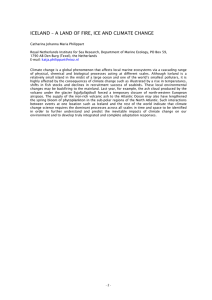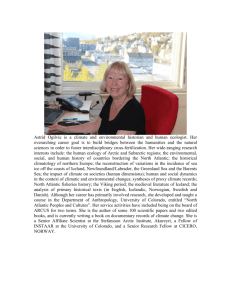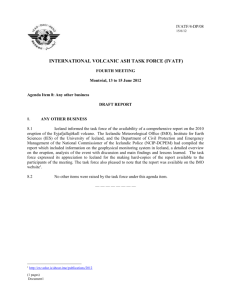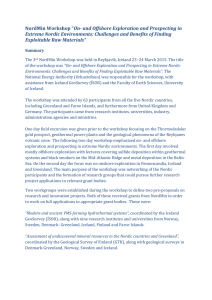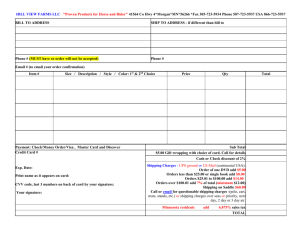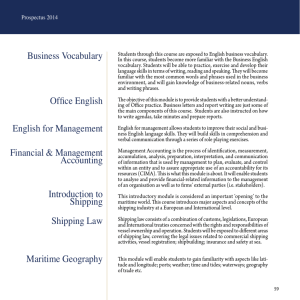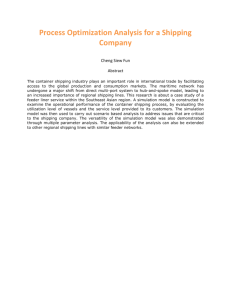- Arctic Portal Library
advertisement
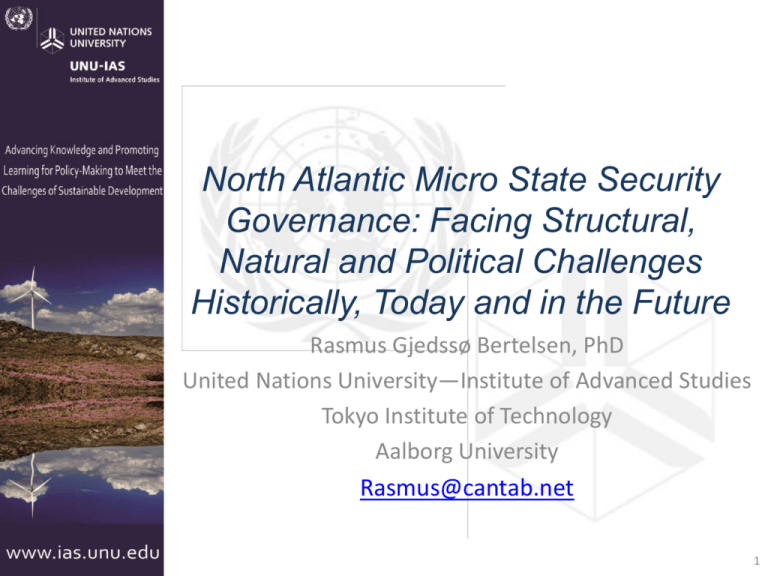
North Atlantic Micro State Security Governance: Facing Structural, Natural and Political Challenges Historically, Today and in the Future Rasmus Gjedssø Bertelsen, PhD United Nations University—Institute of Advanced Studies Tokyo Institute of Technology Aalborg University Rasmus@cantab.net 1 Nexus of Environmental and Political Processes in the North Atlantic Climate Change Independence Politics Security Policy 2 Interacting environmental, structural and political conditions for security policy • Climate change: warming (increased energy exploration and shipping) • Arctic and Subarctic (expensive) environmental conditions, energy, marine resources • Permanent structural conditions: highly developed micro-states (limited absolute capabilities) with vast strategic spaces • Long term political change: Faroese and Greenlandic increasing self-government 3 Policy challenges for micro states with vast spaces • Public finance dilemma: few taxpayers for large investments and expenses for patrol vessels, aircrafts, helicopters, etc. • Public administration dilemma: small organizations with limited specialization • Foreign/security policy challenge: exercise effective sovereignty, etc., over vast spaces with very limited absolute resources • Successful mix of domestic capabilities and alliance partnerships • Creating vocabularies and capacity 4 Iceland—history • Setting the Direction for North Atlantic Microstate Security Policy • Security through distance • Viking settlers • Norwegian king 1262, Danish-Norwegian union 1380 • Sporadic Danish/Norwegian naval activity • Althingi 1845, legislative, budgetary power 1874 • Home rule 1904, Islands Falk 1906, Coast Guard Fund 1913 • Kingdom of Iceland 1918, Þór 1924, Óðinn 1926 • Republic of Iceland (1940) 1944 5 Iceland—current • Geopolitical integration through technology • NATO, US-Iceland defense agreement • Mix of domestic (Coast Guard, etc.) and foreign (US) capabilities • Cod Wars • Domestic expertise and vocabulary • Policy, capabilities and legislative review after Keflavik shock 2006 • Financial crisis 6 Iceland—future • Climate change, energy, shipping • Increased energy shipping between Barents Sea and North America • Trans-Arctic shipping, transshipment in Aleutians and Iceland? • EU membership? 7 Faroe Islands—history • Viking settlers, absorbed by Norway, Danish-Norwegian union, Kiel peace • Løgting 1852 • Icelandic inspiration, family ties • Streneous WWI connection with Denmark • British WWII occupation 8 Faroe Islands—current • Home rule 1948 • LORAN station, GIUK gap, NATO Sornfelli radar • Copenhagen defense and security policy and partnership • Broad security concept • Faroe Islands Fisheries Inspection 9 Faroe Islands—future • 2005 home rule, take over policy areas such as police, air traffic, etc. • Enter into international agreements • Membership of international organizations • Energy exploration, trans-Arctic shipping 10 Greenland—history • Inuit immigration • Norse settlers, king of Norway, disappearance • Danish-Norwegian recolonization in 1721, Kiel peace • US bases, US-Danish 1941 and 1951 agrements • County status 1953 • Home rule 1979 11 Greenland—current • Key role in North American/North Atlantic security • Thule and National Missile Defense • Igaliku agreement, 2004 • International aggreements 2005 12 Greenland—future • Self rule 2009, ’people’, natural resources, issues, independence • Funding (growing) independence • Climate change, energy, shipping 13 Discussion • Research and policy debate on organization of broad security in North Atlantic in face of: • Climatic challenges (warming) • Environmental challenges • Structural challenges (micro-states) • Political challenges (US withdrawal, FO & GL growing self-government) • Balance between domestic capabilities and alliance partnerships • Smart security for small island states Thank you Rasmus@cantab.net 14
